
An interview with Professor Jeff Bloodworth
JMC Resident Historian Elliott Drago sat down with JMC Miller Fellow Jeff Bloodworth to discuss his work on American liberalism and what motivates his study of history. Dr. Bloodworth is Professor of History and Program Director of Public Service and Global Affairs at Gannon University.
Go to the past and look
ED: Why did you become an American historian?
JB: Stories. I grew up in the American South. I was raised by my grandparents. On the porch, at the dinner table or in the car, they told stories. That was our entertainment. That’s how we connected. I love stories.
When I discovered that you could be paid to teach and write history for a living—I couldn’t believe it. I still can’t believe that somebody pays me to read, think, write, and teach.
As an adult history spoke, and still speaks, to me. It helps me explain the world to myself.
JB: Americans need historians who tell coherent and complicated stories about the American past. We don’t need cynical histories that only detail our faults. Likewise, we don’t need hagiographies that gloss over our national sins and failures. We need histories that tell a complicated story about the world’s most important democratic experiment. History matters.
ED: What led you to write your book?
JB: I grew up in a conservative era and in a conservative area of the nation (the South and Ozarks). As a 20-year-old I wondered, “what happened to American liberalism?” Why did voters turn against it and toward Reagan?
I went to graduate school to answer that question. Blessedly, I studied under one of the great historians of American liberalism, Alonzo Hamby. He changed my life. I will forever be in his debt. I am a heterodox thinker because of him. That means I don’t always “fit” into neat ideological boxes. I learned from Hamby that intellectual integrity and honesty are all that matters.
Being a writer and thinker won’t make you popular. If you are always popular, then you are doing something wrong.
The Reagan Revolution
ED: Why do we need to read your book?
JB: America democracy desperately needs durable center-left and center-right political parties. My book examines how American liberals lost the “center” in the 1970s and ceded that political ground to Reagan. The Reagan Revolution emerged because liberals ceased to offer coherent solutions to the big issues of the day. It is “usable history.”
Political elites are far too often hyper-partisans who are surrounded by the very online and other hyper-partisans. They lose touch with the political center. Their parties then lose elections. History doesn’t repeat itself, but it does rhyme, as Twain said. My book tells a story about American liberalism in the 1960s-1980s. But it also should sound familiar to anyone watching our two major parties slide toward the political margins and ignoring the political center.

ED: What does your book’s subject matter reveal about America’s founding principles and history?
JB: American voters, of the 1780s or 1980s, hew to certain enduring national traits: optimism, individualism, and pragmatism. American politics operates at its best when political parties embrace those malleable, yet meaningful, categorical imperatives. Franklin Roosevelt and Ronald Reagan both operated within those broad traditions. Conservatives or liberals lose when they stray from those boundaries.
ED: What is your next project?
JB: I am two-thirds of the way through a biography on Speaker Carl Albert. He was Majority Leader during the 1960s and Speaker during Watergate.

A rural Oklahoman and liberal Democrat, Albert demonstrates a strain of liberalism from rural America. Our rural-urban divide reveals that we need conservatives who can speak to urbanites and liberals who can speak to rural America. Albert’s career demonstrates the rise and fall of liberalism in rural America.
It offers a path back for liberals interested in so-called “red” America. But I am also writing a lot of essays and pieces for mass market sites, see here, here, and here. We historians need to engage the wider public with our ideas and insights. Only writing for journals and academia has left Americans with lots of bad simplistic history (on the right and left).
ED: What’s one thing you wish everyone knew about American history?
JB: Don’t go into the past looking for goblins. You will find them. Don’t go into the past looking for heroes. You will find them.
Go to the past and look for humans who are doing their best to achieve their ideals in a fallen and complicated world. If you do that, you’ll find inspiration.
ED: Thank you for your time and inspiration, we will continue to follow your work!
To keep up with Dr. Bloodworth’s writings, please follow him on Twitter @jhueybloodworth.
Elliott Drago serves as the JMC’s Resident Historian and Editorial Manager. He is a historian of American history and the author of Street Diplomacy: The Politics of Slavery and Freedom in Philadelphia, 1820-1850 (Johns-Hopkins University Press, 2022).
